In this fast-growing life, we all need everything as fast as the speed of light. Quick money, Quick fame and Quick Love. Fad diets are what fast is in Nutrition. Do not fall for it. And know how and why in this article.
The term “fad diet” is used to describe a particular type of diet that becomes popular quickly and then fades away just as fast. The word “fad” itself refers to a temporary trend or fashion that becomes popular for a short period and then loses its appeal.
What Are Fad Diets?
Do the pictures below look familiar?? Maybe you have seen it, searched on it, or even subscribed for one such program? Let me tell you a secret about it.
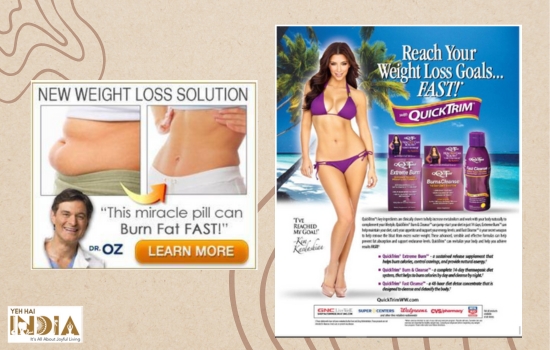
Fad diets are eating plans that gain popularity quickly but often disappear just as fast. They are characterized by extreme or restrictive rules regarding food choices, macronutrient ratios, or eating patterns.
The term “fad diet” emerged to describe the fleeting nature and often questionable effectiveness of these dietary trends.
While some people may experience short-term weight loss or other effects, fad diets are generally not considered sustainable or healthy in the long run.
History of Fad Diet
Fad diets have been around for a long time and have evolved over the years. They typically emerge as a result of various factors, including changing societal attitudes towards body image, the desire for quick and effortless weight loss, the influence of popular culture, and the marketing efforts of individuals or companies.
Here’s a brief overview of the history of fad diets:
Fad Diet: Early 19th Century
Vinegar and water diets:
In the early 1800s, vinegar and water diets gained popularity. These diets involved consuming diluted vinegar, often promoted as a way to suppress appetite and aid digestion.
20th Century
The Cigarette Diet:
In the 1920s and 1930s, smoking cigarettes to suppress appetite and promote weight loss became briefly popular, fuelled by misleading marketing campaigns.
Recommended Article: Keto Diet 101: Everything You Need To Know
The Grapefruit Diet:
In the 1930s, the Grapefruit Diet emerged, which claimed that consuming grapefruit or grapefruit juice with meals would facilitate weight loss.
Low-Fat Diets:
Starting in the 1970s, low-fat diets gained popularity, driven by the belief that reducing fat intake was the key to weight loss and improved health. This led to the proliferation of fat-free or low-fat food products.
The Atkins Diet:
In the early 2000s, the low-carbohydrate Atkins Diet gained significant attention. It promoted high-protein, high-fat, and low-carbohydrate eating, and became a cultural phenomenon.
Why Do People Follow Fad Diets?
People indulge in fad diets because of certain reasons including its promising weight loss effects. Society emphasizes weight loss, and the fact that it has rapid effects attracts the community to try it out.
Many people are keen on trying anything out which promises them quick weight loss results, until the time, they realise that they are either starving or seeing its harmful effects on their bodies.
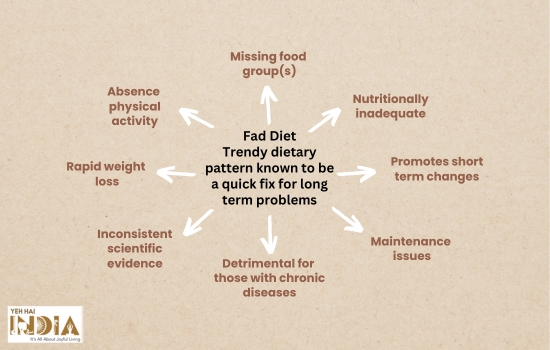
Fad diets are generally misinterpreted. Nutrition study is vast and complex, concluding its healthy effects based on one study does not make it a well-researched subject.
Unlike mainstream diets that undergo rigorous scientific testing and scrutiny, fad diets often lack substantial scientific evidence to support their claims.
On the other hand, companies and marketers make the most out of this opportunity to raise their business. They often market their diets as revolutionary or “secret” approaches to weight loss, promising dramatic results in a short period.
The marketing tactics used can be persuasive, appealing to people’s desire for immediate and effortless transformation. It’s important to note that fad diets are generally considered unsustainable and may not provide adequate nutrition or long-term health benefits.
For individuals seeking to improve their health and well-being, it is advisable to consult with healthcare professionals or registered dietitians who can provide evidence-based guidance tailored to their specific needs.
TYPES OF DIETS
1. Atkins Diet (AD)
During the 1970s, Dr Robert Atkins developed a diet known as the low carbohydrate, high protein (LCHP) diet. This diet gained popularity and was outlined in his book “Dr Atkins’ New Diet Revolution.”
The primary purpose of this diet was to achieve rapid weight loss. Advocates claimed that it was the simplest and most energy-rich diet for maintaining weight loss compared to other options.
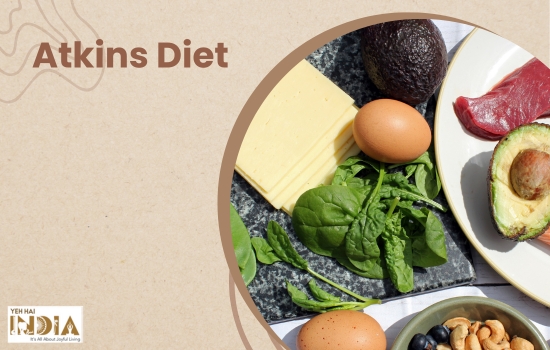
This LCHP diet involved significantly reducing carbohydrate intake to less than 5% of total calorie consumption while increasing protein and fat intake. It also emphasized adequate fluid intake, along with vitamin and mineral supplementation, and regular exercise.
The extent of research on the Atkins diet is limited, and there are always potential complications associated with LCHP diets. Several studies have suggested detrimental effects on the formation of urinary stones due to the consumption of LCHP diets.
Individuals following the LCHP diet for six weeks reportedly experienced a decrease in urine pH, increased uric acid excretion, and reduced calcium balance, all of which increased their risk of developing stones.
One case report documented the experience of a 40-year-old obese woman who presented with symptoms such as nausea, vomiting, and dehydration. Further investigation revealed that she had been following the Atkins diet, resulting in a weight loss of 9 kg in just one month. Laboratory findings were consistent with ketoacidosis, a condition characterized by significantly elevated levels of ketones in the blood, leading to acid accumulation.
(Source: NCBI)
Recommended Article: Collagen Supplements: Healthy or Harmful
ADVANTAGES:
- Quicks Weight Reduction
- Improved Cardiac Health
- Increase HDL Cholesterol (Good Cholesterol)
- Reduced Hunger
DISADVANTAGES:
- Kidney diseases like Kidney stone formation.
- Ketoacidosis
- Increase in LDL Cholesterol (Bad Cholesterol)
- Nutrient Deficiency
Ketogenic Diet (KD)
In 1923, Dr Russell Wilder developed the Ketogenic Diet for the treatment of epilepsy (a neurological disorder affecting the brain).
The classic keto diet is a strict diet comprised of a 4:1 ratio, which means one part of carbs and proteins combined for four parts of fats.
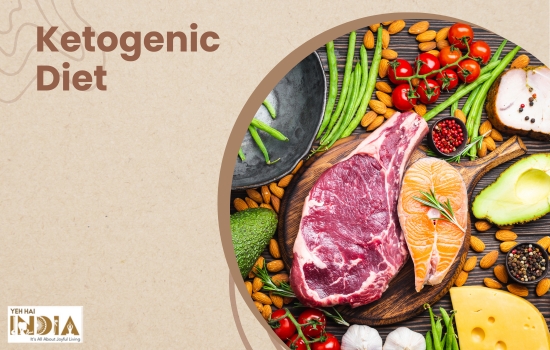
KD is a VLCD (Very Low Carbohydrate Diet) that involves a moderate amount of proteins, high fat, and low carbohydrates that provide approximately 5–10% of calories from carbohydrates, 20–25% of calories from proteins, and 65–80% of calories from fats.
KD is an effectively-developed diet for improving quality of life, seizure severity, and seizure frequency in epileptic patients. It is known for its neuroprotective action in various neurological illnesses like Alzheimer’s disease, Parkinson’s disease, ischemic brain injury, traumatic brain injury, depression and autism. In today’s world, KD is recognized as a weight loss intervention.
A ketogenic diet may negatively impact the lipid profile. It showed that those on KD therapy had low normal bone mineral density, 8.8% of study subjects got kidney stones.
ADVANTAGES:
- Rapid weight loss
- Appetite control
DISADVANTAGES:
- High LDL level
- Nutrient deficiencies
- Imbalance of gut microbiota
Palaeolithic Diet (PD)
The PD also referred to as the Stone Age or a caveman diet was introduced in 1985 by Eaton and Konner. It claimed to improve health and cure diseases like obesity, cardiovascular disease, diabetes, cancer, and osteoporosis.
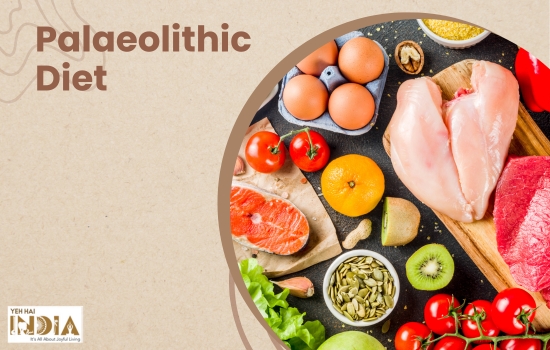
The palaeolithic diet concept believes that the modern diet is the cause of modern diseases and obesity. Moreover, humans evolved before agricultural development, thus Palaeolithic foods are more suitable to humans than the current modern diet.
The palaeolithic diet involves a varied diet comprising plants, grains, legumes, and game meats. There is no restriction on the consumption of lean meats, fruits, and non-starchy vegetables while dairy products, legumes, cereals, and processed foods are strictly restricted.
There is little to no focus on portions, and calories. This diet is not nutritionally balanced. Micronutrient deficiencies can have long-term adverse outcomes.
ADVANTAGES:
- Increased fibre intake
- Reduced use of processed and sugary food items
- Potential weight loss
DISADVANTAGES:
- Risk of IBD due to high meat intake
- Restrictions with dairy items, making calcium consumption difficult
- More challenging to follow compared to other diets
- Decrease in HDL Cholesterol
Intermittent Fasting (IF)

Intermittent fasting has gained a lot of popularity mainly due to many influencers, and celebrities adopting this diet for their weight loss, and is widely adopted as an effective weight loss intervention.
Contrary to the weight loss programs that are based on calorie restriction, IF is more about scheduled eating. Some of the key features of IF are abstinence from food for a certain period, followed by a period of normal eating.
ADVANTAGES:
- Simplified eating pattern
- Metabolic benefits
- Helps in weight loss and Body Composition
DISADVANTAGES:
- Challenges with frequent starvation
- Difficult to keep a balanced diet by eating everything at one time
- If not guided well, starvation could lead to unhealthy cravings and consumption.
Recommended Article: Olive Oil Benefits: Amazing Qualities Beyond Flavour
That is why, fad diets are here for a short-term effect. It can sustain us throughout our life. Many diets come up claiming weight loss, and fat loss effects. It’s easy to fall into these traps when one is desperately wanting to achieve their goal, but patience is key when it comes to health.
The faster you are getting results, the faster you will lose it too. It is very important to be able to identify which is a fad diet and which is a healthy diet, which can help you not only lose weight but also maintain it, provide other health benefits and cure the existing diagnosis.
Identify a Fad Diet
- Usually described as a weight loss plan that guarantees quick weight loss with not much effort.
- Does not emphasize any physical activity
- Focuses on consuming large quantities of one food
- Have restrictions which are not usually sustainable
- Involved starvation.
Identify a Healthy Diet
- Should include all Macronutrients like Carbohydrates, Protein and Fat in a balanced proportion and Micronutrients like vitamins, A, B, C, D, E, and K and Minerals, like Zinc, Iron, Calcium, and Magnesium in adequate proportion.
- Should promote whole and unprocessed foods
- Should include variety and moderation
- It should be sustainable and flexible according to your lifestyle, needs and requirements of the body.
- Nutrition is vast; Hence, it should be evidence-based.
- You should feel happy and energetic by following that diet.
- Your body should feel satisfied with no hunger pangs.
- No extreme starvation should be involved.
To Conclude,
Every fad diet will have short-term potential effects, but it will inevitably come with long-term consequences too. It’s always safe to follow a healthy balanced diet and get the results slowly but steadily, instead of following a fad diet and achieving results in a week.
Fad diets suggest that instead of seeking short-term fixes, it is more beneficial to focus on long-term, sustainable changes in eating habits and lifestyle for improved health and well-being. Eat local. Listen to your body.
Avoid processed food and Stay Hydrated and Be Happy. That’s all you need to stay healthy.
Frequently Asked Questions
Q1. Are there any fad diets that are beneficial or supported by evidence?
There are a few diets with some evidence-based support that appear better than others. It’s important to note that individual results may vary, and it’s always advisable to consult with a healthcare professional before making significant changes to your diet. The Mediterranean diet has proved to be an excellent diet including a balance of all food groups adding omega 3 through fish and the use of olive oil and plant protein sources makes it a healthy diet.
Q2. Are there any specific populations or individuals who should avoid fad diets?
Yes, Pregnant and lactating women have increased needs for folic acid, iron and overall nutrients. People suffering from any medical condition like cardiovascular problems, diabetes, kidney disorders, etc. Children and adolescents should not follow such fads as they are rapidly growing and their requirement for food is higher. Elderly individuals have unique nutrition requirements and thus such fad diets won’t help them meet them.
Q3. What are some alternative approaches to weight loss and healthy eating that are more sustainable than fad diets?
A balanced diet is the best way to maintain health or lose weight. Apart from that, controlling portions while consuming every food group and not overeating. Nothing can be substituted for physical activity, one needs to have physical movement of at least 30 mins every day. Practise mindful eating on day to day basis to understand what and how much the body needs food.
Q4. How can individuals make informed decisions about their dietary choices and avoid falling into the fad diet trap?
Seek evidence-based decisions, always go to an expert before starting any kind of diet to understand what needs to be done to achieve your health goals, always look for long-term sustainability, be patient with yourself, and focus on consistency.
REFERENCES:
Also Read: Refined vs Unrefined oil: Which one is the best for your health?










